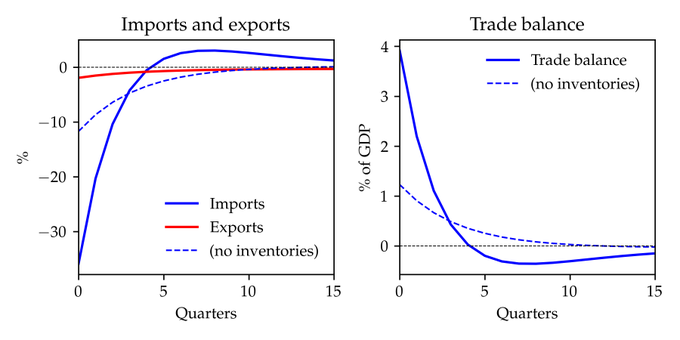トランプ関税に関する論文をもう一丁。 Adrien Auclert(スタンフォード大)、Matthew Rognlie(ノースウエスタン大)、Ludwig Straub(ハーバード大)による表題の論文(原題は「The Macroeconomics of Tariff Shocks」)を著者の一人(Straub)が連ツイで解説している(H/T タイラー・コーエン)。
New paper on recent US tariffs with Matt Rognlie and @a_auclert
Our focus: effects of temporary increases in tariffs (“tariff shocks")
Three Qs:
1 Will tariffs lead to a recession?
2 Will they reduce the trade deficit?
3 Why are they not appreciating USD? (as in std theory)
🧵
First off, two key unknowns:
- the response of the Fed
- retaliation by other countries
We begin with uni-lateral tariffs and no Fed response.
Why temporary tariffs? There will be trade deals, litigation, elections, reversals…
With that, how do we tackle our three questions?
We start with a dynamic macro model (Gali-@monacelt) & add:
- incomplete markets
- exports use labor + imports in production (realistic)
- sticky wages & flex prices (likely realistic)
See flowchart for details. Extensions in the paper.
So what are the answers to our questions?
1) Recession?
3 channels matter for aggregate demand:
(-) households hold back due to higher prices (eg buy cars later)
(-) exports become less competitive
(+) firms substitute away from imports
Each summarized by an elasticity! Recession if - outweighs +.
Is this the case?
Yes! With conservative numbers, we find tariffs to be recessionary.
Why? Export demand is more elastic than import substitution and households are very elastic to higher prices, esp. in extension with durables
Plots below from version with durables. GDP falls, then bounces back
As an aside: This directly builds on much prior work in Mundell-Fleming models, e.g. here is a screenshot from @paulkrugman (1982) paper “The Macroeconomics of Protection...”
Channels not quite the same, but still interesting precursor!
Let’s keep going …
2) What about trade deficits?
Trade balance improves for reasonable parameters. Exports fall but imports fall much more!
Especially so in an extension with inventories: imports collapse as firms rely on inventories…
… but as soon as tariffs are lowered, imports rise sharply!
3) Exchange rate?
Std long-run theory: import tariffs *appreciate* exchange rate (fewer USD to foreigners…)
Not here!
If tariff shock is recessionary & Fed is expected to lean against it, may well see a *depreciation* in the short run! Also get lower r*.
Is this it?
What if there is symmetric retaliation?
Recession more likely, trade deficit widens, exchange rate even weaker!
In fact: any country with share of world GDP < 50% sees trade deficit *worsen* when starting a trade war vs. everyone else!
Okay … but what about *welfare*?
We don’t study optimal tariffs (see @itskhoki Mukhin) but can still evaluate welfare.
3 effects:
(+) Std terms of trade gains
(-) Distortion: tariffs are taxes, Harberger triangles!
(-) Output gap!
Last one is large!
One big dimension is missing…
Announcements of higher tariffs!
Now everything runs in reverse:
Pull forward of durable purchases, before tariff!
Firms stockpile inventories
Can help the economy today … but widens trade deficits!
Once tariffs do rise, the boom turns to a bust.
Much more in the paper: https://shade-econ.github.io/tariff_shocks.pdf
Paper very related to recent tariff papers:
@IvanWerning @guido_lorenzoni, @itskhoki Mukhin, @skalemliozcan Soylu Yildirim, @DBaqaee @HannesMalmberg1,
@JavierBianchi7 @LouphouC, @monacelt, Bergin-Corsetti, …
See also geoeconomics agenda by @chris_d_clayton @m_maggiori, @JSchreger @acoppola4
Also non-tariff papers like my work with @VeronicaGuerri7 @guido_lorenzoni @IvanWerning on Keynesian supply shocks, and previous work with Adrien, Matt and Hugo Monnery on energy shocks.
Many more references in the paper!
Thank you for reading until the end! Leave a comment or RT :)
(拙訳)
直近の米国の関税に関するマット・ロングリーとアドリアン・オークレールとの新たな論文。
我々の研究の焦点:関税の一時的な引き上げの影響(「関税ショック」)。
3つの疑問:
- 関税は景気後退につながるか?
- 関税は貿易赤字を減らすか?
- なぜ(標準理論のように)米ドルを増価させていないのか?
以下スレッド。
第一に、2つの重要な未知の要因:
- FRBの反応
- 他国の報復
まず、一方的な関税、かつFRBが反応しない場合から始める。
なぜ一時的な関税とするか? 貿易のディール、訴訟、選挙、撤回があり得るので。
その前提で、3つの疑問にどう取り組むか?
動学マクロモデル(ガリ=モナセリ)を基に、以下を追加する:
- 不完全市場
- 輸出は生産において労働力と輸入を使用(現実的)
- 粘着的な賃金と伸縮的な価格(現実的であろう)
詳細はフローチャート参照。拡張版は論文に。
では、我々の疑問への回答はどうなるか?
1) 景気後退?
総需要には3つの経路が重要:
(-) 家計が価格上昇によって買い控える(自動車購入を遅らせるなど)
(-) 輸出競争力が下がる
(+) 企業が輸入代替に移行する
それぞれの効果は弾力性に要約される! マイナスがプラスを上回れば景気後退となる。
そうなるだろうか?
そうなる! 保守的に見積もった数字で、関税が景気後退的であることを我々は見出した。
なぜか? 輸出需要は輸入代替よりも弾力的である。また、家計は価格上昇に対して非常に弾力的であり、特にモデルを耐久財について拡張した場合にそうである。
以下は各種耐久財についての図である。GDPは低下後、反発する。
余談:今回の研究は、かなり以前のマンデル=フレミングモデルにおける研究に直接的に基づいている。例えば以下はポール・クルーグマンの1982年の論文「(変動相場制下の)保護主義のマクロ経済学」のスクリーンショットである。
経路は全く同じではないが、それでも興味深い先駆的研究である!
話を先に進めよう・・・。
2) 貿易赤字についてはどうか?
妥当なパラメータについて、貿易収支は改善する。輸出は低下するが、輸入はもっと低下する!
特に在庫について拡張したモデルではそうである。企業は在庫に頼り、輸入は急落する・・・
・・・が、関税が引き下げられるや否や、輸入は急上昇する!
3) 為替相場?
標準的な長期理論では、輸入関税は為替相場を「増価」させる(海外にとって米ドルがより稀少となる)
ここでは違う!
もし関税ショックが景気後退的でFRBがそれに対処すると予想されるならば、短期的には「減価」の可能性がある! また、r*も下がる。
これが今回のケースなのか?
対称的な報復関税があった場合はどうなるか?
景気後退の可能性は高まり、貿易赤字は拡大し、為替相場はさらに弱くなる!
実際のところ、世界GDPに占める比率が5割以下のどんな国でも、他国すべてに対し貿易戦争を始めたら、貿易赤字は「悪化する」!
ということだが・・・では、「厚生」はどうなるか?
我々は最適関税を研究していないが(Itskhoki=Mukhinを参照)、それでも厚生を評価することはできる。
3つの効果がある:
(+) 標準的な交易条件の利得
(-) 歪み:関税は税である。ハーバーガーの三角形!
(-) 生産ギャップ!
最後の項は大きい!
ただ、上記では一つの大きな要因が欠けている・・・
関税引き上げの声明である!
その場合、すべてが逆に動く。
関税引き上げ前の耐久財の駆け込み購入!
企業は在庫を積み上げる。
今日の経済の助けとなり得る・・・が、貿易赤字は拡大する!
実際に関税が引き上げられると、好況は不況に転じる。
論文にはさらに多くのことが書かれている。https://shade-econ.github.io/tariff_shocks.pdf
最近の関税に関する論文とも大いに関連している*1。
- Werning, Iván and Arnaud Costinot, “How Tariffs Affect Trade Deficits,” Working Paper, April 2025.*2
- Itskhoki, Oleg and Dmitry Mukhin, “Can a Tariff be Used to Close a Long-run Trade Deficit?,” Working Paper, April 2025.
- Kalemli-Özcan, Ṣebnem, Can Soylu, and Muhammed A. Yildirim, “Global Networks, Monetary Policy and Trade,” Working Paper 33686, National Bureau of Economic Research, April 2025.*3
- Baqaee, David and Hannes Malmberg, “Long-Run Effects of Trade Wars,” Working Paper, April 2025.
- Bianchi, Javier and Louphou Coulibaly, “The Optimal Monetary Policy Response to Tariffs,” Working Paper, March 2025.*4
- Monacelli, Tommaso, “Tariffs and Monetary Policy,” Working Paper, April 2025.
- Bergin, Paul R. and Giancarlo Corsetti, “The Macroeconomic Stabilization of Tariff Shocks: What Is the Optimal Monetary Response?,” Journal of International Economics, July 2023, 143, 103758.
等々。
また、Christopher Clayton、Matteo Maggiori、Jesse Schreger、Antonio Coppolaの地経学の研究も参照*5。
また、関税絡みでない私の以下の共著論文のようなケインズ的な供給ショックに関する論文*6や
- Guerrieri, Veronica, Guido Lorenzoni, Ludwig Straub, and Iván Werning, “Macroeconomic Implications of COVID-19: can Negative Supply Shocks Cause Demand Shortages?,” American Economic Review, 2022, 112 (5), 1437–1474.
エネルギーショックに関する以前の共著論文*7も参照。
論文にはもっと多くの参照論文が掲載されている!
最後まで読んでくれてありがとう! コメントを残すか、RTして頂ければ幸甚。
*1:ツイートでは以下に著者名(Xアカウントを持っている人はそのアカウント)を挙げているが、ここでは論文の参照文献から該当の論文を引用しておく。
*2:ツイートではWerningとともに@guido_lorenzoniにリンクしているが誤りと思われる。
*3:前回エントリ「世界的なネットワーク、金融政策、および貿易 - himaginary’s diary」で紹介した論文。
*4:「関税への最適な金融政策の反応 - himaginary’s diary」で紹介した論文。
*5:cf. 経済学の地経学への回帰 - himaginary’s diary。
*6:これもツイートでは著者名(Xアカウント)を挙げているが、ここでは論文の参照文献から該当の論文を引用しておく。cf. 供給ショックが需要不足につながる時 - himaginary’s diary。
*7:これは論文の参照文献に収録されていない。cf. エネルギーショックの制御:財政金融政策 - himaginary’s diary。









